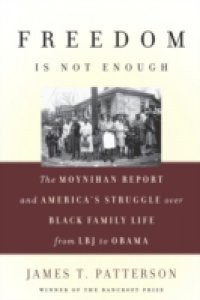On June 4, 1965, President Lyndon Johnson delivered what he and many others considered the greatest civil rights speech of his career. Proudly, Johnson hailed the new freedoms granted to African Americans due to the newly passed Civil Rights Act and Voting Rights Act, but noted that freedom is not enough. The next stage of the movement would be to secure racial equality as a fact and a result.The speech was drafted by an assistant secretary of labor by the name of Daniel Patrick Moynihan, who had just a few months earlier drafted a scorching report on the deterioration of the urban black family in America. When that report was leaked to the press a month after Johnsons speech, it created a whirlwind of controversy from which Johnsons civil rights initiatives would never recover. But Moynihans arguments proved startlingly prescient, and established the terms of a debate about welfare policy that have endured for forty-five years.The history of one of the great missed opportunities in American history, Freedom Is Not Enough will be essential reading for anyone seeking to understand our nations ongoing failure to address the tragedy of the black underclass.

